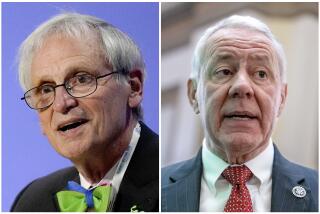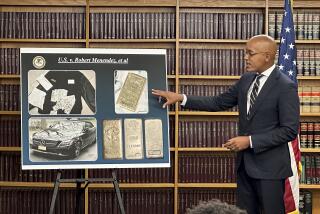WASHINGTON INSIGHT
- Share via
WHO CARES: Anyone searching for a barometer of how low America’s interest in the world has sunk need look no further than the Senate’s prestigious Foreign Relations Committee. The committee, once so sought-after that the likes of Edward M. Kennedy (D-Mass.) and the late Jacob Javits had to wait around a decade to get on board, has been reduced to lobbying freshman senators to fill its ranks for the 105th Congress. On the Republican side, it took a lunch and some coaxing from respected committee veteran Richard G. Lugar of Indiana to talk Chuck Hagel (R-Neb.) and Gordon Smith (R-Ore.) into filling two of the empty seats. “None of the new members initially chose Foreign Relations, but they [Hagel and Smith] eventually agreed to come,” Lugar noted. Reflecting on the changed priorities among his colleagues, Lugar recalled how he barely managed to fight his way onto the committee in the 1970s, only to be told he might not be able to stay. “I came on as the sixth of six Republicans and was warned I could get bumped if things went badly [for the GOP] in [the] 1980 [elections],” he said. They didn’t, and he stayed.
*
LESS LAWYERLY: For the first time since 1953, the House has more members from the world of business than it has lawyers. The number of representatives from business rose sharply during the Republican revolution two years ago, but the trend had been underway for more than a decade. Twenty years ago, for instance, the 95th Congress had 222 lawyers and just 118 members from business. The new 105th Congress has 181 representatives with business backgrounds and 172 lawyers. The trend is likely to continue because state legislatures, the pool from which House members often rise, reflect the same shift, said Burdett Loomis, a political science professor at the University of Kansas and an expert on Congress. “Lawyers are finding it increasingly difficult to serve in the state legislature while simultaneously maintaining a private practice,” Loomis said. What does it all mean for Congress? “Businessmen know what it’s like to meet a payroll in the private sector; they have confidence that the government isn’t the answer, but rather is often the problem,” Loomis said.
*
WHINING AND DINING: The gift restrictions Congress approved for itself a year ago must be a ripping success, judging by the cries of pain from Capitol Hill restaurants. The congressional newspaper The Hill reports that high-end restaurants are closing or cutting back all around that end of Pennsylvania Avenue. As the owner of the popular Le Mistral told the newspaper, “The gift-ban rules are putting me out of business.” The restrictions strictly limit the meals--and other items of value--members of Congress and staff can accept from lobbyists and others. While those complaints may soothe critics of Congress outside the Beltway, many in Washington see the ban as Victorian. As The Hill said in an editorial: Congress “should recognize that there’s nothing inherently wrong with taking a member or staffer to lunch or dinner to discuss business, as is a common practice in American society.” But the newspaper also conceded: “It’s doubtful that the new gift restrictions have countered the public perception that many members of Congress are unduly influenced by being wined and dined.”
*
REVERSING FIELD: David Maraniss, who wrote a biography on President Clinton, is giving new meaning to “political football.” The Washington Post reporter’s book about the president, “First in His Class,” drew high praise for its look at how a small-town boy rose to power. Maraniss’ new project: a biography of legendary football coach Vince Lombardi, who built a hapless professional football team from tiny Green Bay, Wis., into a world champion three decades ago.
More to Read
Get the L.A. Times Politics newsletter
Deeply reported insights into legislation, politics and policy from Sacramento, Washington and beyond. In your inbox twice per week.
You may occasionally receive promotional content from the Los Angeles Times.










